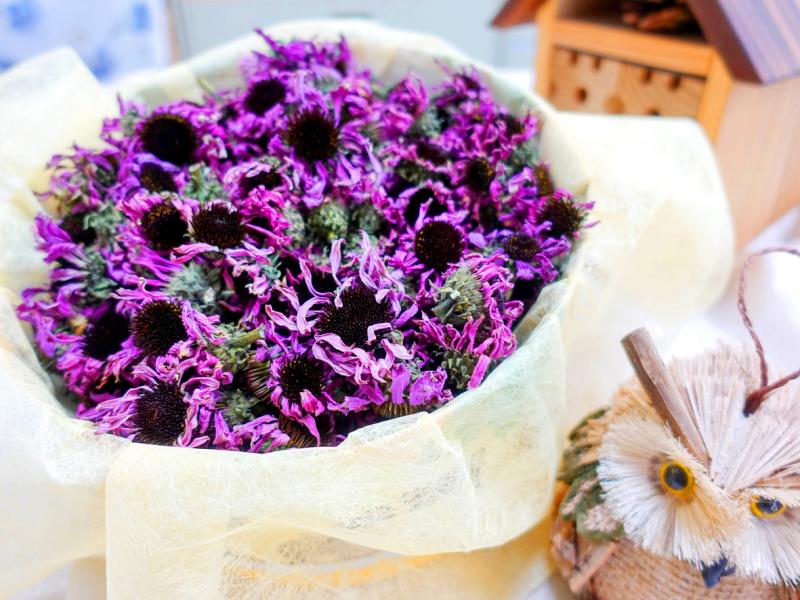A local variety of Echinacea purpurea grown by the Taichung District Agricultural Research and Extension Station could be useful in the development of a COVID-19 drug, the station said.
Swiss researchers have discovered that when used as a component in medicines, Echinacea purpurea — commonly known as the purple coneflower — showed some effectiveness in combating strains of coronavirus, station director Lee Hung-hsi (李紅曦) said on Thursday, adding that the particular variety of flower grown at the station was shown to be more effective than others.
Samples of the plant were earlier this month given to National Taiwan University Hospital to begin testing its effectiveness in combating COVID-19, she said.

Photo courtesy of the Council of Agriculture
The station began trying to propagate the plant eight years ago due to the growing international market for health food and preventive health products, Lee said.
“There are more than 1,000 medical research papers published worldwide that talk about the health benefits of the purple coneflower,” she said, adding that it was found to be effective in bolstering the immune system and reducing inflammation.
The plant is particularly effective in combating adenoviruses and coronaviruses, she said.
The annual value of the domestic market for coneflowers is estimated to be NT$30 million to NT$40 million (US$1.01 million to US$1.35 million), and that value has the potential to grow tenfold given the size of the country’s population and the scale of the market, she said.
However, the coneflowers sold in Taiwan are European and US varieties, which do not grow well in Taiwan, as they are not suited to the climate, Lee said, adding that this was part of the motivation to develop a local variety.
The local variety can produce 2,700kg per hectare, and its caffeic acid derivative content is 6.1 percent greater than that of the European and US varieties, which makes it particularly useful for scented tea and biotechnology applications, she said.
The Council of Agriculture expects the local variety to account for 90 percent of the domestic market within a year, Lee said.
During its research, the station worked with 10 different producers and several farmers to create an effective supply chain for horticulture, cultivation, post-harvest processing, extraction and product manufacturing, she said.
The station has already tested the flower’s effectiveness in 100 different holistic medicine products, and is hopeful that products using the flower’s extract can gain a foothold in the lucrative cold medicine market, Lee said.

The Grand Hotel Taipei on Saturday confirmed that its information system had been illegally accessed and expressed its deepest apologies for the concern it has caused its customers, adding that the issue is being investigated by the Ministry of Justice Investigation Bureau. The hotel said that on Tuesday last week, it had discovered an external illegal intrusion into its information system. An initial digital forensic investigation confirmed that parts of the system had been accessed, it said, adding that the possibility that some customer data were stolen and leaked could not be ruled out. The actual scope and content of the affected data

‘LIKE-MINDED PARTNER’: Tako van Popta said it would be inappropriate to delay signing the deal with Taiwan because of China, adding he would promote the issue Canadian senators have stressed Taiwan’s importance for international trade and expressed enthusiasm for ensuring the Taiwan-Canada trade cooperation framework agreement is implemented this year. Representative to Canada Harry Tseng (曾厚仁) in an interview with the Central News Agency (CNA) said he was increasingly uneasy about Ottawa’s delays in signing the agreement, especially as Ottawa has warmed toward Beijing. There are “no negotiations left. Not only [is it] initialed, we have three versions of the text ready: English, French and Mandarin,” Tseng said. “That tells you how close we are to the final signature.” Tseng said that he hoped Canadian Prime Minister Mark Carney

POSITIVE DEVELOPMENT: Japan and the US are expected to hold in-depth discussions on Taiwan-related issues during the meeting next month, Japanese sources said The holding of a Japan-US leaders’ meeting ahead of US President Donald Trump’s visit to China is positive news for Taiwan, former Japan-Taiwan Exchange Association representative Hiroyasu Izumi said yesterday. After the Liberal Democratic Party’s landslide victory in Japan’s House of Representatives election, Japanese Prime Minister Sanae Takaichi is scheduled to visit the US next month, where she is to meet with Trump ahead of the US president’s planned visit to China from March 31 to April 2 for a meeting with Chinese President Xi Jinping (習近平). Japan and the US are expected to hold in-depth discussions on Taiwan-related issues during the

President William Lai (賴清德) yesterday bestowed one of Taiwan’s highest honors on Saint Vincent and the Grenadines (SVG) Ambassador Andrea Clare Bowman in recognition of her contributions to bilateral ties. “By conferring the Order of Brilliant Star with Grand Cordon on Ambassador Bowman today, I want to sincerely thank her, on behalf of the Taiwanese people, for her outstanding contribution to deepening diplomatic ties between Taiwan and SVG,” Lai said at a ceremony held at the Presidential Office in Taipei. He noted that Bowman became SVG’s first ambassador to Taiwan in 2019 and